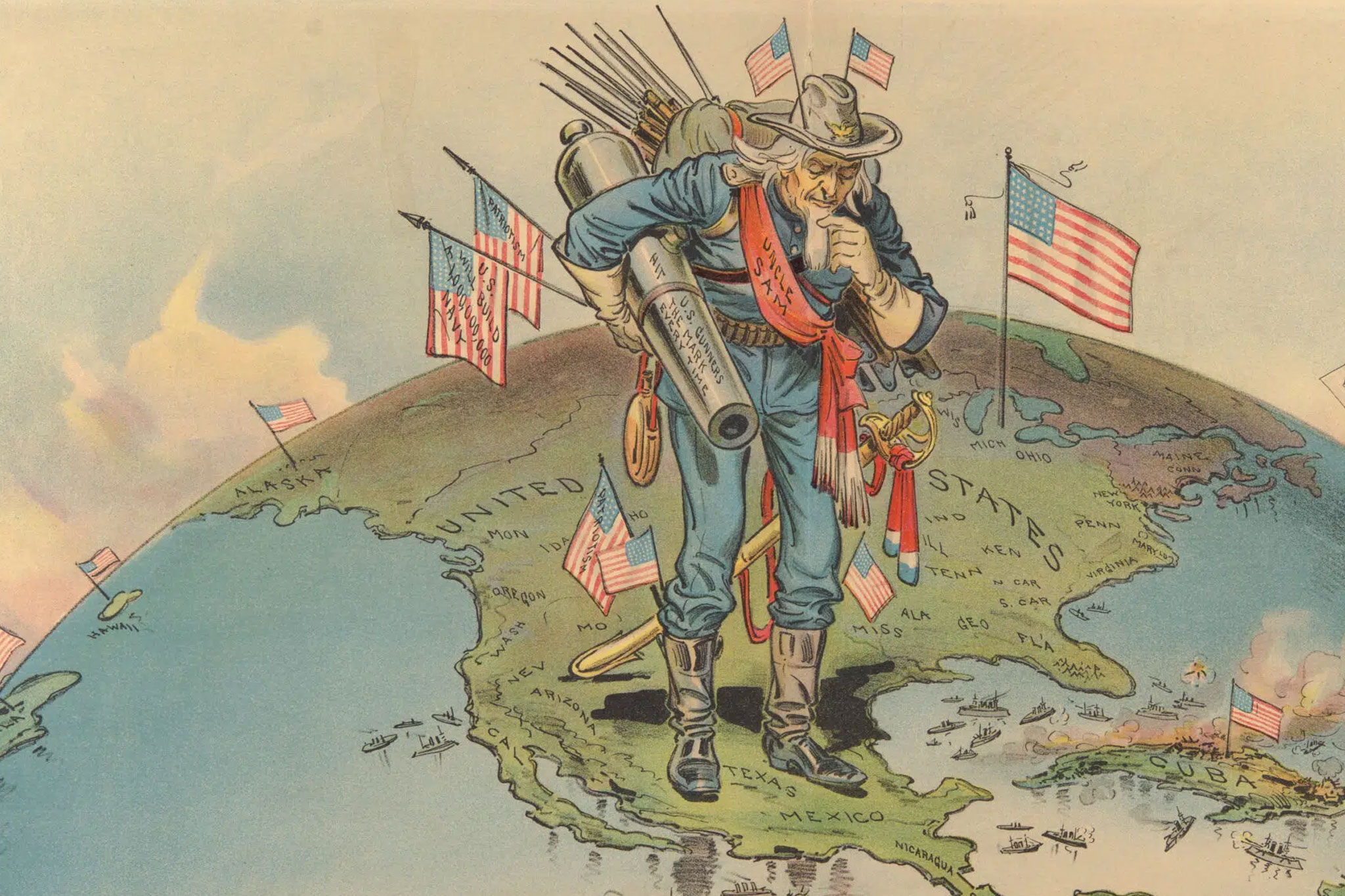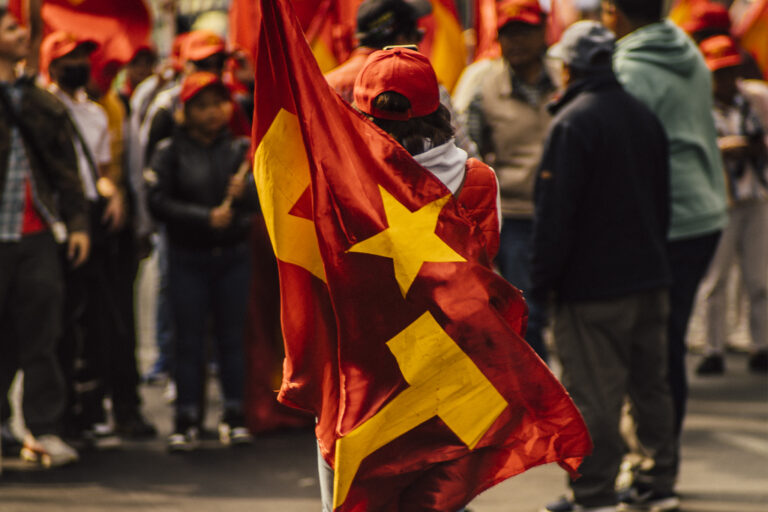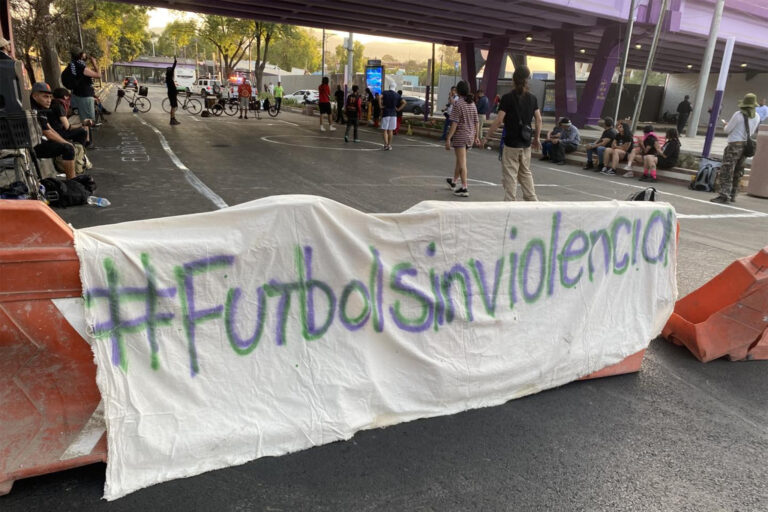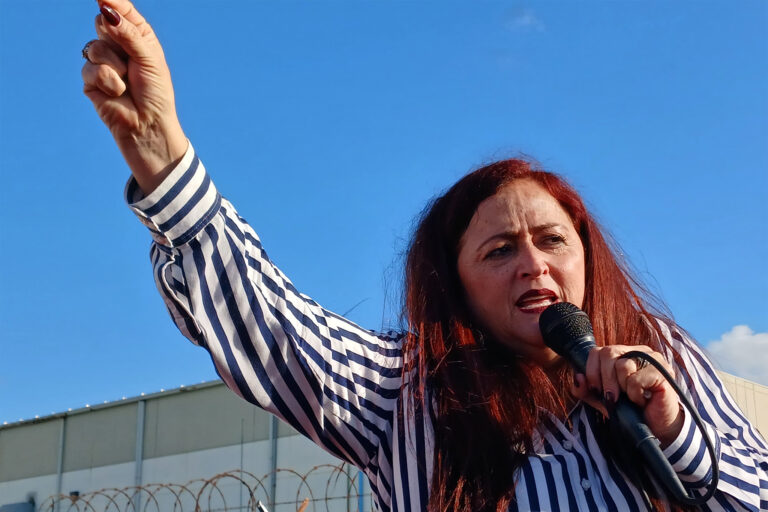The US is Behind NGOs and Think Tanks That Oppose Mexico’s Fourth Transformation
This article by Anibal García Fernández appeared in the June 14, 2025 edition of Revista Contralínea. The views expressed in this article are the author’s own and do not necessarily reflect those of the Mexico Solidarity Project.
United States departments and agencies fund, train, or maintain some form of assistance to Mexican non-governmental organizations, think tanks, and companies dedicated to the judicial sector, several of which are litigating against the Mexican State and the Fourth Transformation. Mexico is one of the targets of “soft power” exerted by its northern neighbor, and although much more is known about certain NGOs, little is known about the think tanks and companies that have specifically funded projects focused on transforming the broader judicial sector in Mexico.
From 2001 to 2024, the United States government funded a large number of organizations to promote changes in the Mexican government across various areas. As detailed in previous investigations, these changes were primarily promoted by three departments and several agencies, but focused on three programs linked to promoting reforms in the justice , security, and anti-drug sectors.
This section of the research will detail the main companies that invested in resources in Mexico. The company that received the most funding was Management System International (MSI) with $209 million (constant 2023 dollars). It was followed by Chemonics International Inc. with $91.3 million.
Both companies outsource the funding they obtain from the United States government for various programs. For example, MSI was one of the main companies that ultimately implemented changes in the justice sector, with a series of programs to transform this key sector in Mexico, which is currently undergoing a process of democratization following the reform of the judiciary.
The United States government defines the justice sector as including police, border security, prosecutors, forensic experts, judges, court personnel, public defenders, prison staff, private attorneys, law schools, legal professional associations, and training institutions.
Sixteen major US-funded companies, NGOs, and think tanks in Mexico
NGO/Think Tank |
$USD (2023) |
|---|---|
|
Management Systems International |
209.7 |
|
Chemonics International, Inc. |
91.3 |
|
International Organization for Migration |
70.4 |
|
Abt Associates, Inc. |
62.8 |
|
The Nature Conservancy |
59.0 |
|
Tetra Tech, Inc. |
42.8 |
|
American Council on Education |
41.9 |
|
Development Alternatives, Inc. |
39.7 |
|
Alutiiq, LLC |
36.9 |
|
ARD, Inc. |
35.1 |
|
Casals and Associates, Inc. |
27.6 |
|
Council of State Governments |
26.8 |
|
National Endowment for Democracy |
26.2 |
|
Social Impact, Inc. |
21.8 |
|
Management Sciences for Development, Inc. |
19.4 |
|
Pronatura Mexico |
18.2 |
Colonized Justice
In the case of MSI, of the seven projects it had, three concentrated 94 percent of all the funding it received from USAID. One of the funded projects was for 87 million 902 thousand 571 million dollars (constant 2023) between 2009 and 2016. [1] According to data consulted by Contralínea from official sources of the United States government, its objectives were “to work with state and federal justice institutions to strengthen their capacity to improve transparency, public oversight and public accountability, and better serve Mexican citizens under the new constitutional reforms that shape the police and criminal procedure codes.”
The PROJUST Project, according to data reviewed by Contralínea, states that its objective was to “provide direct or indirect personalized support at the state and federal levels for the final push towards the 2016 reform deadlines, helping selected Mexican states pass the “point of no return” in their judicial system reforms , and, therefore, contribute to broader efforts by the United States Government and the Government of Mexico to mitigate conflict, reduce impunity and promote a more transparent and efficient justice system.” This project was funded between 2015 and 2022 for 86 million 954 thousand 888 dollars.
Finally, another project was for $22,439,876. The objective was to improve “observance of due process and increase the protection of citizens’ rights. The reforms contributed to the Mexican system’s transition from an inefficient, closed, written, and inquisitorial system to a more reliable, oral, and adversarial one.”
Casals y Asociados received funding from USAID to implement nine projects in Mexico. One of the most important, related to justice sector reforms, was the “Governing with Justice: More Responsive and Transparent Governance” program. Between 2004 and 2008, it received $19,113,431.
Four other programs related to justice stand out:
- “Improve policies, laws, regulations, and administrative practices affecting the private sector. This includes reducing obstacles to competition and unjustified distortions in market prices; reducing policy and regulatory barriers to business establishment, operation, and closure; strengthening the legal framework for property rights that is equitable for men and women; contract enforcement and dispute resolution, along with the administration of such laws; reducing incentives for corruption and promoting transparent business practices; strengthening the legal framework surrounding intellectual property rights; improving laws and regulations affecting the creation, diffusion, and use of technology. This also includes improving policies and regulations affecting technological choices and production behaviors with environmental impacts; and improving policies, laws, and regulations affecting the hiring and firing of workers, wages, working conditions, and collective bargaining. This includes support for specific improvements, as well as efforts to strengthen institutions that contribute to designing and implementing new improvements.”
- “Improve the capacity and sustainability of civil and criminal sector actors and institutions, improve coordination among them, develop citizen demand for an effective and accountable justice system, and develop partnerships to advocate for all citizens. Justice sector actors and institutions include: police, border security, prosecutors, forensic experts, judges, court personnel, public defenders, prison personnel, private lawyers, law schools, legal professional associations, and training institutions for each. Work toward an equitable justice system by ensuring equality before the law, fair trial standards, and other elements of procedural fairness. Ensure more equitable access to justice through innovations within and outside the state system and through improvements in the quality and quantity of justice services, with particular attention to women, youth, the poor, and other marginalized or vulnerable groups. Programs primarily focused on trafficking in persons or migrant smuggling should be included in element 5.3 of the peace and security objective, within the area related to justice.” to transnational crime.”
- “ Promote transparent and accountable governance institutions, processes, and policies across all development sectors. Support governmental and non-governmental institutions (including implementing and research entities, independent audit bodies, anti-corruption commissions, public procurement agencies, legislatures, line ministries, independent agencies, political parties, judicial actors, as well as civil society organizations, academia, the press, and the private sector). Support civic education and advocacy activities to reform laws and practices or directly improve the accountability and transparency of governance processes across various development sectors.”
- Strengthen the legal, regulatory, institutional, and informational environment that protects and enables the growth of associative life and the development of independent and sustainable civil society organizations (CSOs). Develop the capacity of civil society organizations to act as agents of reform and support their participation in the democratic decision-making process by articulating and representing their members’ interests and participating in service delivery; and advocate for issues that become part of the public agenda and are reflected in public policies. Promote the strengthening of a civic culture that supports democratic institutions and processes, active participation in political and civic life, and the civic virtues of tolerance, pluralism, commitment, trust, and respect for individual rights, including gender equality.
Another company dedicated to promoting changes in the Mexican state’s justice system is Management Sciences for Development, Inc. This company had four projects between 2008 and 2011 totaling $19,386,640. Of those four, three were related to justice sector reforms and promoting reforms through NGO funding .
Management Sciences for Development Programs with US funding
Program |
$USD (2023) |
|---|---|
|
Promote the protection of international human rights, including labor rights, not covered by other elements. This element supports governmental and non-governmental organizations created to protect, promote, and enforce human rights. Support programs to educate governments on the incorporation of human rights standards and practices into all government activities. |
274,592 |
|
Improve the capacity and sustainability of civil and criminal justice sector actors and institutions, enhance coordination among them, develop citizen demand for an effective and accountable justice system, and develop partnerships to advocate for all citizens. Justice sector actors and institutions include: police, border security, prosecutors, forensic experts, judges, court personnel, public defenders, prison staff, private attorneys, law schools, legal professional associations, and training institutions for each. Work toward an equitable justice system by ensuring equality before the law, fair trial standards, and other elements of procedural fairness. Ensure more equitable access to justice through innovations within and outside the state system and through improvements in the quality and quantity of justice services, with particular attention to women, youth, the poor, and other marginalized or vulnerable groups. Programmes focusing primarily on trafficking in persons or migrant smuggling should be included under element 5.3 of the peace and security objective, within the area relating to transnational crime. |
18,065,852 |
|
Strengthen the legal, regulatory, institutional, and informational environment that protects and enables the growth of associative life and the development of independent and sustainable civil society organizations (CSOs). Develop the capacity of civil society organizations to act as agents of reform and support their participation in the democratic decision-making process by articulating and representing their members’ interests and participating in service delivery; and advocate for issues that become part of the public agenda and are reflected in public policies. Promote the strengthening of a civic culture that supports democratic institutions and processes, active participation in political and civic life, and the civic virtues of tolerance, pluralism, commitment, trust, and respect for individual rights, including gender equality. |
597,238 |
Unrelated to justice issues, but openly opposed to the Mexican government, USAID, through MSI, funded a “Protection of Defenders and Journalists” program for $7,918,833. This program ran from 2021 to 2024, with funding substantially increasing from $1.5 million in 2022 to $3.4 million in 2024.
The project’s objective was “to support the protection of human rights and the environment, and for state organizations to prevent and counter violence and threats against human rights defenders, environmental defenders, and journalists in Mexico. The project will support five target states in Mexico, along with indirect assistance to four other states, if possible.”
NGOs also Operated in the Judicial Sector
However, it’s not just companies; it’s also NGOs and think tanks such as the Idea Foundation, the Ethos Foundation, Fortis Consulting, and the Center for Studies on the Teaching and Learning of Law (CEEAD) that have operated with US resources to influence the justice sector.
As can be seen in the following map, in addition to the NGOs mentioned above, there are other types of NGOs that received funding from the United States and other foundations and companies to strengthen the pattern of accumulation that was established in Mexico in the 1990s and that left profound consequences for the Mexican population.

Among these other NGOs, we can highlight the Ethos Foundation, which, according to its own website, claims to have funding from USAID, NED, INL, the World Bank, the Ford Foundation, the Kellogg Foundation, the British Embassy in Mexico, among others.

According to data consulted by Contralínea, this Foundation received funding for three projects between 2013 and 2016 and between 2019 and 2022 and 2024. One of the projects focused on “The immediate deduction of fixed assets and its impact on Mexico’s competitiveness” between 2013 and 2015, amounting to $420,566 in 2023 dollars.
The following project was for a “Study to determine how public-private partnerships (PPPs) for innovation should be implemented in Mexico in five different modalities” between 2014 and 2016 for $404,959 in 2023 dollars. This program, like the previous one, occurred just as the far-reaching structural reforms implemented by Enrique Peña Nieto’s government were being implemented.
Finally, the project financed in the years 2019, 2022-2024 for one million 309 thousand 471 dollars of 2023. According to the data consulted by Contralínea that come from the United States government, this project was for “The objective of the activity Strengthening national and local systems to fight corruption through the participation of civil society and the private sector is to promote the application of the National Anti-Corruption System (NAS) and select local systems to fight corruption in key border states, through citizen education, commitment and participation of the private sector.”
For its part, the IDEA Foundation had a project from the State Department and two more from USAID between 2013 and 2024. Between 2021 and 2023, the State Department granted funding for 4 million 523 thousand 904 dollars of 2023. The program was to “Grant the IDEA Foundation [resources] to implement the project Technical Assistance and Support of the Attorney General’s Offices of Mexico.”
USAID funded two more projects for the IDEA Foundation. The first, between 2013 and 2016, amounted to $1,875,083 to achieve the objective of “Developing a national policy to promote youth well-being.”
The second project was for “reducing impunity and will help build the capacity of both civil society and the government to sustainably increase the effectiveness of the criminal justice system in 12 Mexican states. (1) strengthen the capacity of justice sector institutions to provide effective and efficient case resolution, increase the total number of resolved criminal cases, and improve the quality and quantity of investigations and prosecutions of serious crimes; (2) build the capacity of justice sector institutions to provide due process and human rights protection, as well as adequate services for victims; and (3) enhance the capacity of judicial sector institutions and civil society to build legitimacy, trust, and citizen cooperation, fostering accountability and citizen participation. This will be achieved through training, technical assistance, mentoring, and peer-to-peer networking.
This last project received $373,916 in funding in 2019, $550,212 in 2022, $635,775 in 2023, and $662,152 in 2024, for a total of $2,222,055.

Fortis Consulting was funded directly by USAID, although together with the Idea Foundation it implemented the INL program for Institutional Improvement and Strengthening of the Prosecutor’s Offices and Attorney General’s Offices in Mexico, MI FISCALÍA.
The USAID project was to “help local actors address the underlying factors that prevent institutions from minimizing due process violations and arbitrary acts by the state (including, but not limited to, indefinite detention and misuse of discretionary powers) that violate human rights, as well as factors that impede effective remedies for victims. JAVA will focus on engaging civil society in protecting due process and improving victim assistance by implementing strategies that leverage their existing capacities and by strengthening the technical understanding of these organizations to enable them to develop sophisticated policy change strategies. JAVA will also focus on communicating the importance of due process for specific policy purposes and to specific audiences.” This project was funded between 2020 and 2024 for $5,618,675.
As mentioned on their website, Fortis Consultoría also received funding from the International Bureau of Narcotics and Law Enforcement Affairs (INL) and the Open Society Foundation, which, as can be seen on the interference map, has also funded Fundar, México Evalúa, and Práctica—which, together with México Evalúa and Di-Sentir, formed the Judicial Electoral Observatory.

CEEAD, Continuity of Technical Interference
One particularly noteworthy case is the Center for Studies on the Teaching and Learning of Law (CEEAD). This study center received $16.5 million in funding between 2013-2017 and 2021-2023.
Five projects were funded by USAID for $1.9 million between 2013 and 2017 as part of the implementation of the modification of the accusatory criminal justice system to oral trials. CEEAD was one of the centers that aimed to work with law schools to “adapt their programs to the new criminal justice system. The initiative will strengthen at least 200 law schools, both public and private, located in 24 states, with special emphasis on those located in underserved communities.”

Four other projects funded by the State Department between 2021 and 2023 for $14.6 million for “the project entitled Construction of a Certification System for Justice Sector Operators in Mexico” for $1,939,376. Another project entitled A5344262-M003. CEEAD. Center for Studies on Teaching and Learning of the D. Cost and duration of the grant Universities as key institutions in the consolidation of the NCJS for $1,050,962.
The other two projects are “Cooperation Agreement with CEEAD for the project entitled Construction of a Certification System for Operators in the Justice Sector in Mexico” in 2022 for 5 million 825 thousand 410 and in 2023 for 5 million 838 thousand 203, according to official records from the United States government.
As mentioned, CEEAD implemented the Certification for Justice in Mexico (CEJUME) program. Under this program—also sponsored by the International Bureau for Narcotics and Law Enforcement Affairs (INL)—it trained personnel associated with prosecutorial offices in the areas of Public Prosecutor’s Office, criminal defense, legal counseling for victims, and facilitating personnel for Alternative Dispute Resolution Mechanisms (ADRs).
According to data from the CEJUME website, they have trained 12,022 people nationwide. The top states have been Mexico City, Michoacán, the State of Mexico, Hidalgo, Sinaloa, Sonora, and Nuevo León.

Finally, CEEAD has also had academic ties with the Center for Constitutional Studies and the Federal School of Judicial Training of the Supreme Court of Justice of the Nation, an institution that often sends personnel to congresses.

Within the extensive network of companies, think tanks, and NGOs funded by the United States, as well as by domestic and foreign companies and foundations such as the Atlas Network, Open Society, the Ford Foundation, the Konrad Adenauer Foundation, and the Friedrich Neuman Foundation, among others, there are those who systematically opposed the implementation of energy reforms and also implemented a series of other projects linked to the judiciary.
-
Workers Party Claims Sheinbaum Electoral Reform Will Eliminate Party System
The socialist party’s leader recalled the democratic spaces that the left managed to conquer with the 1977 & 1996 reforms, a “fruit of countless struggles, repressions, imprisonments, disappearances and even armed uprisings.”
-
Anti-FIFA Challenge: Football Defends the Territory
Mexico City residents are organizing Anti-World Cup Days to protest water theft and gentrification that have accompanied preparations for the World Cup, put on by the corrupt, international criminal consortium known as FIFA.
-
Tridonex Strike in Matamoros to Start March 6th
1,300 workers are expected to strike, demanding the company fulfill its obligation to pay workers in full. Tridonex is owned by First Brands, the US autoparts corporation accused of massive fraud.




